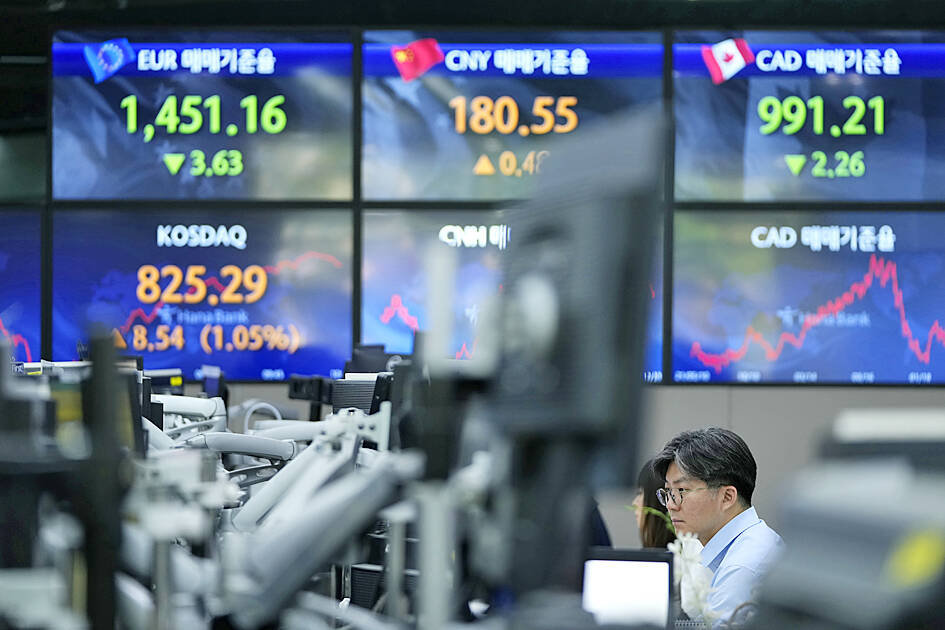Japan’s economy grew at an annual pace of 1.6 percent in the quarter through March as private demand rebounded after COVID-19 restrictions were eased, data released yesterday showed.
Real GDP, which measures the sum value of a nation’s products and services, grew 0.4 percent quarterly in the January-to-March period in the world’s third-largest economy, the Japanese Cabinet Office said.
That was the fastest pace of GDP growth since the 1.1 percent growth in the April-to-June period last year. It was also better than the market consensus forecast of 0.2 percent.

Photo: AP
Japan’s benchmark Nikkei 225 gained 0.8 percent to finish at 30,093.59 on the news of solid economic growth data.
The annualized pace shows what the growth would have been if what was marked during the quarter had continued for a year.
The biggest contributor to growth was private demand, surging an annual 3.1 percent, with consumer spending and private investment showing a healthy rebound. The recent opening of borders to tourists and other incoming travel has also helped consumption perk up.
Public demand grew at an annualized 1.8 percent.
“Japan’s economy appears to be on a gradual recovery track despite sluggish global demand,” ING Groep NV chief Asia Pacific economist Rob Carnell said
Some analysts think such signs of recovery will prompt Japan’s central bank to take action on a policy change and move toward higher interest rates.
The Bank of Japan policy board meets next month.
On the negative side, slowing exports dragged on growth, reflecting lagging global economies. Japan’s exports in the January-to-March period dropped an annualized 15.6 percent.
While much of the world, including Europe and the US, has been focused on inflationary pressures, Japan has been more cautious about its approach to inflation, because it has been hit by decades of the opposite problem: deflation, when prices spiral down.
Electricity bills were recently raised across the nation. Although that does not directly affect core inflation, the move is likely to have a trickle-down effect and boost inflation, analysts say.
The relatively positive read for the Japanese economy could even work toward supporting Japanese Prime Minister Fumio Kishida’s standing with the public, which has had its ups and downs. Speculation is simmering that Kishida might call a snap parliamentary election later this year.

BYPASSING CHINA TARIFFS: In the first five months of this year, Foxconn sent US$4.4bn of iPhones to the US from India, compared with US$3.7bn in the whole of last year Nearly all the iPhones exported by Foxconn Technology Group (富士康科技集團) from India went to the US between March and last month, customs data showed, far above last year’s average of 50 percent and a clear sign of Apple Inc’s efforts to bypass high US tariffs imposed on China. The numbers, being reported by Reuters for the first time, show that Apple has realigned its India exports to almost exclusively serve the US market, when previously the devices were more widely distributed to nations including the Netherlands and the Czech Republic. During March to last month, Foxconn, known as Hon Hai Precision Industry

Taiwan Semiconductor Manufacturing Co (TSMC, 台積電) and the University of Tokyo (UTokyo) yesterday announced the launch of the TSMC-UTokyo Lab to promote advanced semiconductor research, education and talent development. The lab is TSMC’s first laboratory collaboration with a university outside Taiwan, the company said in a statement. The lab would leverage “the extensive knowledge, experience, and creativity” of both institutions, the company said. It is located in the Asano Section of UTokyo’s Hongo, Tokyo, campus and would be managed by UTokyo faculty, guided by directors from UTokyo and TSMC, the company said. TSMC began working with UTokyo in 2019, resulting in 21 research projects,

Ashton Hall’s morning routine involves dunking his head in iced Saratoga Spring Water. For the company that sells the bottled water — Hall’s brand of choice for drinking, brushing his teeth and submerging himself — that is fantastic news. “We’re so thankful to this incredible fitness influencer called Ashton Hall,” Saratoga owner Primo Brands Corp’s CEO Robbert Rietbroek said on an earnings call after Hall’s morning routine video went viral. “He really helped put our brand on the map.” Primo Brands, which was not affiliated with Hall when he made his video, is among the increasing number of companies benefiting from influencer

Quanta Computer Inc (廣達) chairman Barry Lam (林百里) yesterday expressed a downbeat view about the prospects of humanoid robots, given high manufacturing costs and a lack of target customers. Despite rising demand and high expectations for humanoid robots, high research-and-development costs and uncertain profitability remain major concerns, Lam told reporters following the company’s annual shareholders’ meeting in Taoyuan. “Since it seems a bit unworthy to use such high-cost robots to do household chores, I believe robots designed for specific purposes would be more valuable and present a better business opportunity,” Lam said Instead of investing in humanoid robots, Quanta has opted to invest